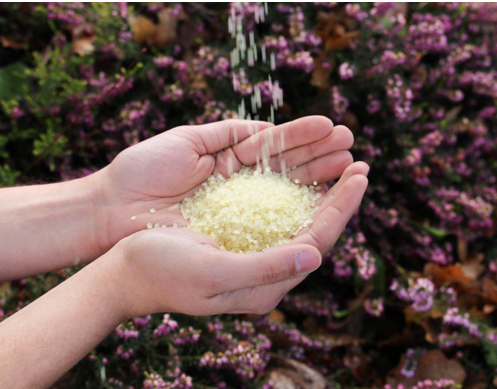|
|

|
  
Features
Update 2020/4/20
Plastics
"THE MILKY WAY OF PLASTICS"- FRENCH START-UP CREATES A FULLY BIODEGRADABLE NATURAL POLYMER USING MILK CASEIN
By Suzanne Forcese
Tucked away in the Loire department of central France a team of innovative scientists and entrepreneurs has developed a game-changing technology that respects the environment. Saint-Jean-Bonneford, ideally situated between industry and nature, is home to the young company. Lactips is quickly gaining recognition and awards throughout Europe for their contribution to the Circular Economy as a recovery channel for milk products that are not consumed.
WaterToday had the pleasure of an interview with Charlene Beal-Fernandes, Communications Representative, who together with CEO Marie-Hélène Gramatikoff, and co-founder/director Frédéric Prochazka, revealed to us the company’s vision to “Remove plastic from the oceans and keep it in our industries.”
“Because plastic lasts for hundreds of years in our oceans, causing a major pollution issue, Lactips is manufacturing the first polymer with no pollution impact,” Beal-Fernandes said. “Our foundation-- thanks to a pioneering technology -- is in our commitment to developing, manufacturing and marketing an efficient and sustainable alternative to plastic, which is integrated into modern industrial activities and contributes to strengthening good environmental practices.”
Lactips has been developing since 2014. The idea started out as a research project at Saint-Étienne University which began in 2007. The researchers “took seven years to come up with a product that could be industrialized. Now we have a structured company to produce and sell our product,” CEO Gramatikoff said.
“In the beginning, our researchers discovered how to make raw plastic with milk protein. Then the most difficult part was to transform this plastic into film and to find the right water biodegradable, compostable, and bio-sourced additives in order to make industrial-standard film – while respecting the environment.”
Lactips co-founder and professor at Jean Monet University of Saint-Étienne, Prochazka, is also lead researcher in the Polymer Materials Engineering Lab. “Lactips produces a natural polymer which follows the principles of green chemistry,” Prochazka said. Although the solution is currently protected by 6 patent,s WT was able to learn the basics of the technology.
“We are starting with a protein powder (casein),” Prochazka said, “which is introduced into an extruder with other additives. Filaments of plastic are extruded, cooled, cut into pellets and dried. The pellets are a thermoplastic which means they can easily be made into film using existing industry technology.”

Lactips pellets – biodegradable natural polymer made from milk casein
Photo Courtesy Lactips
“Because the film is soluble in water, our first product was packaging for single use dishwasher detergents.” The film leaves no trace unlike conventional organic polymers and is certified ‘Home Compost’.
It is also completely edible.
Lactips wrap provides an excellent barrier to oxygen and grease – properties highly sought after in the food packaging sector in order to preserve the qualities of food. Without the need to add chemical preservatives, the Lactips material makes it possible to ensure optimal shelf-life of food.
“We are also using our Lactips material in industrial packaging in the manufacture of single dose dyes for concrete and textiles.”
Historically the packaging of chemicals has a number of disadvantages. The main issue being the waste chemical residue that is left behind in the packaging – and more importantly—how the packaging is eliminated. “It is estimated that there are approximately 300 million waste chemical bags disposed of each year and many tons of left-over chemicals are ending up in our landfill areas and entering our waterways,” Gramatikoff said. The completely biodegradable Lactip material leaves no residue. The potential for several industry applications exist. Uni-dose products for insecticides, fungicides, herbicides and pesticides are possibilities to ensure food security and environmental protection.
“On the French market, the dairy industry is ranked second of the total food industry, just after the meat industry. You may think that our company will have a negative impact on the dairy industry because our material is based on milk protein but we are actually setting a new recycling industry for milk that is unfit for human consumption.”
From dishwasher detergent wrappers, to single dose agri-chemicals, to pharmaceutical uses, cosmetics --the possibilities are as endless as the imagination.
“The challenge is great but necessary for the future of our planet. Social responsibility and sustainable innovation are at the heart of our policy and actions. This global approach is integrated into the daily lives of more than 45 people who take part in company projects,” plastics engineer and Lactips CEO Marie-Helene Gramatikoff concludes.
suzanne.f@watertoday.ca
|
|
|
Have a question? Give us a call 613-501-0175
All rights reserved 2026 - WATERTODAY - This material may not be reproduced in whole or in part and may not be distributed,
publicly performed, proxy cached or otherwise used, except with express permission.
|
| |